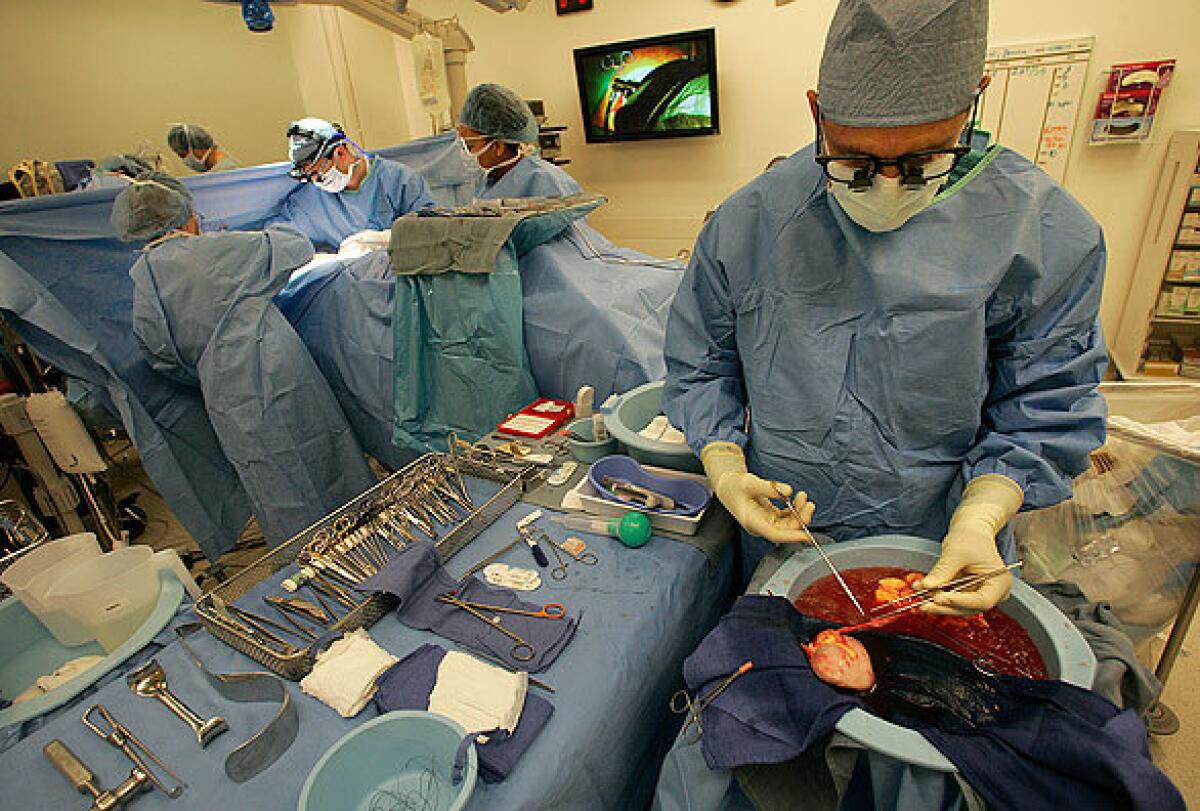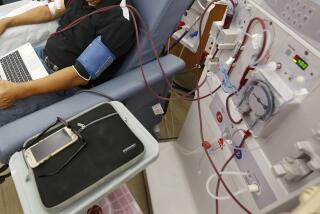I donated my kidney to a stranger — and more of us should

- Share via
For most of my life, I’ve been a model of good health. At 17, I became a certified firefighter, and, at 20, I biked from Texas to Alaska. But last month, at 25, I spent a week in bed recovering from surgery, with fresh incision holes in my abdomen, because I made an unusual choice. I donated my left kidney to someone who dearly needed one — someone whom I don’t know and have never met.
It may have never crossed your mind that you, too, could donate a kidney to someone who is in desperate need. If you are healthy, the risk is quite minimal. But the benefit to the recipient is tremendous, adding roughly 10 years to that person’s life. More than 100,000 Americans suffer from end-stage renal disease, or kidney failure, and are currently waiting to receive a transplant. They endure endless hours of dialysis each week, and, tragically, many will die before it is their turn for a new kidney.
Donors return to work in a matter of weeks, their lives relatively unchanged. While the surgery does leave you with some unpleasant, temporary pain, I can tell you from experience that, with the support of loving family and friends, it’s very manageable.
I first learned about kidney donation amid my own health crisis. An injury to my foot three years ago damaged a nerve, leaving me with debilitating chronic pain. Fortunately, I received much-needed relief with a medical technology that involves wearing a battery that sends electrical pulses to a surgically implanted wire inside my calf; these pulses scatter faulty nerve signals before they reach my brain and reduce my pain.
My nerve damage has made me specially attuned to the destabilizing physical and psychological consequences of chronic health conditions. I wondered: Could I help someone whose body’s faulty machinery is revolting against them, just like mine did? After doing some research, I came to see that the need for kidney donation was great and the cost to me was low. I believe the fortunate have a moral responsibility to redistribute their advantage.
As you can imagine, my parents were less than thrilled when I decided to donate. But as I explained more, they began to come around. Fewer than 3 in 10,000 living donors die from the surgery (a .03% mortality rate), and the risks are even lower for young, healthy folks like me.
Donating has slightly increased my risk for developing kidney disease, but because of the intensive prescreening required to become a donor, I know my risk is still well below that of the general population. Miraculously, my remaining right kidney will grow to compensate for its absent twin.
Making a kidney donation without designating the recipient, as I did, is especially useful, because it allows for the construction of kidney donor chains. Like blood and bone marrow, one person’s kidney is not necessarily a match for another person’s body. A kidney chain allows donors who are not eligible matches with their intended recipient to engage in a nationwide swap to ensure all donor-recipient pairs receive a suitable kidney.
A donation to a stranger starts a chain that allows for many additional donations. But such non-directed donations are quite rare, with only a few hundred transplants out of around 23,000 transplants in the U.S. each year.
There is also special need for minority donors, as currently white transplant candidates receive kidneys more often and more quickly than black, Latino, Native American and Asian candidates.
Perhaps surprisingly, these disparities are not because of unequal access to health care. Kidney disease is a rare example of virtually universal public coverage in the U.S. (Medicare for end-stage renal disease is available to all Americans, not just older Americans.) Instead, the racial disparities in kidney transplantation demonstrate the pernicious ways social and economic inequality can seep into a seemingly equitable system.
Racial minorities are less likely to have a friend or family member give them a kidney when they are in need, perhaps because of the financial burden of donation. While living donors don’t pay any medical bills, they have not been reimbursed for lost wages and travel expenses. Because of geographic clustering of poverty and disease, minority transplant candidates tend to live in places with fewer healthy deceased donor kidneys available. Finally, minority candidates are less likely than white candidates to be an immunological match with white donors, who make up most of the donor pool.
In December, the Trump administration proposed new rules that would increase the federal government’s support for living kidney donors. The change removes financial barriers by reimbursing donors for lost wages and other costs like child-care expenses, hoping to encourage thousands more Americans to donate. You could be one of them.
Sam Trejo is a doctoral candidate in Sociology, Economics, and Education at Stanford University.
More to Read
A cure for the common opinion
Get thought-provoking perspectives with our weekly newsletter.
You may occasionally receive promotional content from the Los Angeles Times.









